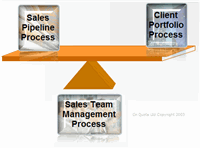
Recently I posted this entry on Wikipedia to give a definition of Sales Pipeline but it was deleted and replaced by a redirect to a term referred to as "Sales Tunnel" !
Who uses Sales Tunnel as a regular term in marketing or sales, I don't know of any.
So for those of you looking for a Sales Pipeline definition here it is:
06:35, 18 December 2007 (UTC)
The Sales Pipeline is typically used in business to business sales to describe the future potential for achieving sales revenues. It is composed of a number of opportunities (or
deals) and/or
Sales Leads that have been identified by a company's marketing, sales or customer service departments.
The Sales Pipeline starts at the point at which someone is identified who may have a need for a company's offering(s).
Sales Pipelines finish as the point when a company receives a
purchase order (or other form of sales order - such as a contractual agreement status).
There is split thinking over whether the Sales Pipeline should include all types of lead. Sometimes it is useful for completeness to include any type of lead as this can present the optimum forecast this is also useful in some organizations where there is a high level of internal political demands (see ref 1). If all types of Leads are included in a Sales Pipeline, then it is useful to have these categorised at the beginning as simple sales inquiries (also known as 'suspects') or qualified leads (also known as 'prospects')(see ref 2).
With this thought leadership in mind the Sales Pipeline can be defined as:
"An estimate of the total sales revenue amount calculated from the volume of opportunities and qualified leads over a fixed period of time where each lead or opportunity is included based upon an estimated sales order date within this fixed period."
The Sales Pipeline works on the principle that at the start of the Sales Pipeline you have an inquiry or lead coming in, which progresses to a qualified opportunity or deal and finally turns in to a financial order. The length of the sales pipeline determines the sales cycle or sales campaign time.
A graphical views of the sales pipeline:
[1] [2]References: Page 20, Managing with Power - Politics and Influences in Organizations, Jeffrey Pfeffer,
ISBN 0-87584-440-5 [1] Page 70, Sales and Marketing The Six Sigma Way, Michael J.Webb, Tom Gorman,
ISBN 978-1-4195-2150-8[2] Page 161 Lead Generation for the Complex Sale - Brian Carroll, ISBN-13:978-0-07-145897-9
[3] Sales & Marketing Common Language published On Quota Ltd. 2004, copyright 2003 Peter Weson, Mark McCarthy & Stephen Pye
[4]







